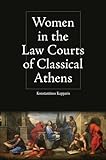Women in the Law Courts of Classical Athens / Konstantinos Kapparis.
Material type: TextSeries: Intersectionality in Classical Antiquity : ICAPublisher: Edinburgh : Edinburgh University Press, [2022]Copyright date: ©2021Description: 1 online resource (288 p.)Content type:
TextSeries: Intersectionality in Classical Antiquity : ICAPublisher: Edinburgh : Edinburgh University Press, [2022]Copyright date: ©2021Description: 1 online resource (288 p.)Content type: - 9781474446723
- 9781474446747
- 340.53850082
- online - DeGruyter
| Item type | Current library | Call number | URL | Status | Notes | Barcode | |
|---|---|---|---|---|---|---|---|
 eBook
eBook
|
Biblioteca "Angelicum" Pont. Univ. S.Tommaso d'Aquino Nuvola online | online - DeGruyter (Browse shelf(Opens below)) | Online access | Not for loan (Accesso limitato) | Accesso per gli utenti autorizzati / Access for authorized users | (dgr)9781474446747 |
Browsing Biblioteca "Angelicum" Pont. Univ. S.Tommaso d'Aquino shelves, Shelving location: Nuvola online Close shelf browser (Hides shelf browser)

|

|

|

|

|

|

|
||
| online - DeGruyter Mediating War and Identity : Figures of Transgression in 20th- and 21st-century War Representation / | online - DeGruyter Police and Community in Twentieth-Century Scotland / | online - DeGruyter Legal Artifices: Ten Essays on Roman Law in the Present Tense : Ten Essays on Roman Law in the Present Tense / | online - DeGruyter Women in the Law Courts of Classical Athens / | online - DeGruyter Land Reform in Scotland : History, Law and Policy / | online - DeGruyter Miracles of Healing : Psychotherapy and Religion in Twentieth-Century Scotland / | online - DeGruyter Exploring Gender Diversity in the Ancient World / |
Frontmatter -- Contents -- Abbreviations -- Introduction -- Part I Cases Involving Women Litigants -- Part II Women and the Athenian Justice System -- Appendix: The Main Laws Affecting the Lives of Athenian Women -- Select Bibliography -- Index of Ancient Authors -- General Index
restricted access online access with authorization star
http://purl.org/coar/access_right/c_16ec
Explores the intersection of gender with important aspects of Athenian society such as citizen status, social values and beliefs, class, economic capacity and legal standingExplores the intersection of gender with important aspects of Athenian society such as citizen status, social values and beliefs, class, economic capacity and legal standingDiscusses how different groups of women, such as citizens, metics, alien and native sex workers, and slaves interacted with law enforcement and the extent to which these groups had access to key institutions in the Athenian DemocracyFor the first time throws some light upon several fascinating fragments, like the two speeches Against Aristagora, or the case against TimandraDiscusses the recent suggestion of a witch-hunt" in 4th century Athens Konstantinos Kapparis challenges the traditional view that free women, citizen and metic, were excluded from the Athenian legal system. Looking at existing fragmentary evidence largely from speeches, Kapparis reveals that it unambiguously suggests that free women were far from invisible in the legal system and the life of the polis. In the first part of the book Kapparis discusses the actual cases which included women as litigants, and the second part interprets these cases against the legal, social, economic and cultural background of classical Athens. In doing so he explores how factors such as gender, religion, women’s empowerment and the rise of the Attic hetaira as a cultural icon intersected with these cases and ultimately influenced the construction of the speeches. "
Mode of access: Internet via World Wide Web.
In English.
Description based on online resource; title from PDF title page (publisher's Web site, viewed 29. Mai 2023)


